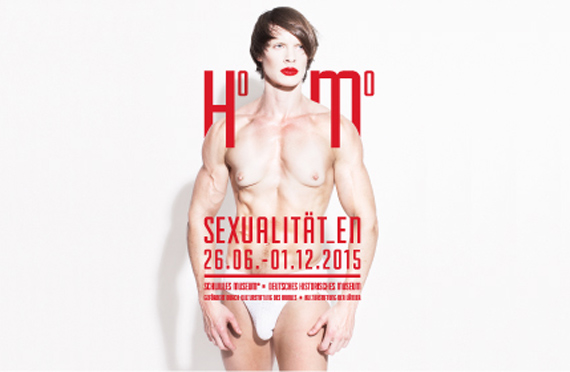Controversial Poster

The exhibition “Homosexualit_ies” will be shown from 13 May to 4 September, 2016 at the LWL – Museum für Kunst und Kultur in Münster, Domplatz 10, 48143 Münster.
Poster for „Homosexualit_ies” exhibition may not be displayed in German train stations
Just before the opening of the exhibition “Homosexualit_ies” at the LWL-Museum für Kunst und Kultur in Münster, Westphalia on 12 May 2016, the German railroad company Deutsche Bahn AG decided that posters for this exhibition may not be displayed on any train stations.
 The poster shows the work “Advertisement: Hommage to Benglis”, part of the series “CUTS: A Traditional Sculpture” by Canadian artist Heather Cassils. He_she is shown with a bare chest and waist, red painted lips, nipple piercings and a jock strap. As performance art, the project explicitly questions gender norms and represents a broad variety of possible forms of sexuality, which is one of the intentions of the exhibition “Homosexualit_ies”, curated by Birgit Bosold, Dorothée Brill and Detlef Weitz. The exhibition is funded by the German Federal Cultural Foundation and the Cultural Foundation of the Federal States of Germany.
The poster shows the work “Advertisement: Hommage to Benglis”, part of the series “CUTS: A Traditional Sculpture” by Canadian artist Heather Cassils. He_she is shown with a bare chest and waist, red painted lips, nipple piercings and a jock strap. As performance art, the project explicitly questions gender norms and represents a broad variety of possible forms of sexuality, which is one of the intentions of the exhibition “Homosexualit_ies”, curated by Birgit Bosold, Dorothée Brill and Detlef Weitz. The exhibition is funded by the German Federal Cultural Foundation and the Cultural Foundation of the Federal States of Germany.
The poster featuring Heather Cassils was seen everywhere in Berlin in 2015, when the original show opened at the Deutsche Historische Museum (National History Museum) and the Schwules Museum*. It was displayed in all neighbourhoods, streets, in train stations and especially within Berlin’s S-Bahn system, which – ironically – belong to the Deutsche Bahn. Now, the office Media & Buch, which is responsible for the approval of advertisement for the Deutsche Bahn AG, has decided that the poster is “sexualized” and “sexist” and therefore does not conform with the guidelines of the German Council of Advertisement (Deutscher Werberat).
Confronted with this somewhat contradictory behavior, the Deutsche Bahn replied that the poster must have accidently “slipped through” in 2015, and that the German public has meanwhile become more sensitive about “sexism”, especially after the incidents of New Year’s Eve in Cologne. This is what they told the German gay magazine “Männer” in a short statement, confirming their general position in this case. As a consequence, the Deutsche Bahn has instructed its advertisement company Ströer not to allocate advertisement spaces in train stations to “Homosexualit_ies”. Ströer has followed this request and offered the LWL-Museum alternative advertisement spaces in the region. The LWL-Museum has accepted
this offer.
We, the Schwules Museum*, on the other hand consider the allegation and the resulting advertisement ban wrong and inappropriate. Cassil’s work is not a breach of the guidelines of the German Council of Advertisement as it neither reduces him_her to his_her sexuality” nor degrades him_her by depicting him_her nude, nor is the poster “pornographic”. While we acknowledge that the poster has been subject to controversy among the gaylesbian community in Berlin, that discussion revolved around politics of representation, as numerous gays and lesbians criticized the poster did not represent the “average” gay and lesbian person “properly” But there were never any accusations of “sexism”. Dr. Birgit Bosold, one of the curators of the exhibitions says: “We want to show that the discrimination of homosexual people is directly linked to gender norms, which are automatically assigning a specific sexual identity to everyone and, at the same time, a sexual desire exclusively towards the ‘other’ sex.”
It is interesting that the Deutsche Bahn AG has no problems showing people – with nudity – in advertisements when they conform the heterosexual norms. Yet an image that obviously questions such norms is being “censored” and considered unacceptable for public display. In the context of the current social backlash and the strengthening of rightwing conservative forces in Germany (and Europe) this decision is a fatal – and highly problematic – signal.
Artwork above right: Advertisement: Homage to Benglis, part of the larger body of work CUTS: A Traditional Sculpture, 2011. Image courtesy of Heather Cassils and Ronald Feldman, Fine Art, New York. © Heather Cassils and Robin Black 2011.
Turn-around of Deutsche Bahn AG regarding “sexist” poster for the exhibition „Homosexualit_ies“ in Münster
Yesterday afternoon, [Tuesday May 12], the Schwules Museum* was informed by their partner organization LWL-Museum für Kunst und Kultur in Münster that the German railroad company
Deutsche Bahn AG revised its ban of the poster for the exhibition “Homosexualit_ies”. This poster features Canadian trans* artist and activist Heather Casills. It may be displayed in train stations in Germany, after the Deutsche Bahn had originally decided against this. We, the Schwules Museum*, view this turn-around skeptical, because of the consequences of the original ban for the LWL-Museum. Also, we find the confusing and contradictory communications of Deutsche Bahn AG problematic.
In principal, we are glad that the Deutsche Bahn AG is no longer considering the poster“sexualized” or sexist”, and we are grateful for the great support – also internationally – we received in our own fight against the Deutsche Bahn during the last days. We see this incident as another argument for our museum’s mission to make LGBTIQ history more visible and fight for such visibility and public acceptance.
But the incident is far from over. Because of the temporary ban, the advertisement company Ströer – which is managing the Deutsche Bahn AG ad spaces – has already rented out the original ad spaces to other clients. Regardless of Deutsche Bahn AG’s new decision to allow the display of the posters in their train stations, the “Homosexualit_ies” poster will not be seen prominently in any such station in Germany in the near future, because all the ad space is already taken. The Deutsche Bahn has not offered any form of compensation for this, yet.
The entire handling of the incident by the Deutsche Bahn AG has left us with a bitter aftertaste. While the official twitter account of Deutsche Bahn AG argued that the poster was deemed “sexist” or “revealing” just yesterday at 11:38 am, barely five hours later we were informed that all concerns were now cleared after a discussion of DB’s press department with the LWL-Museum. This, among other confusing statements, raises the suspicion that the Deutsche Bahn AG only changed its policy to avoid a public debate and damage to its image as a state-owned company. Since the posters cannot be displayed to promote at least the opening of the exhibition, the sudden turn-around of Deutsche Bahn AG is little consolation.
Because this entire incident has tackled very broad and important topics of visibility, awareness and acceptance of LGBTIQ in Germany, we at the Schwules Museum* are upholding our invitation for an open discussion with the officials of Deutsche Bahn AG, either in Münster or in Berlin.
Related Links
Must See Exhibition in Berlin – ‘Homosexuality-ies’
Berlin: Homosexuality_ies